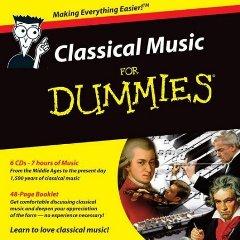Classical Music For Dummies CD 3 - The Rise of Romanticism (2010)
Classical Music For Dummies CD 3 - The Rise of Romanticism (2010)

01. Gluck - Orphee & Eurydice - Ballet des ombres heureuses - R. Capucon-Ducros 02. von Weber - Freischutz - Ouverture (extr.) - Keilberth 03. Rossini - La pie voleuse - Ouverture (extr.) - Giulini 04. Rossini - Guillaume Tell - Ouverture (extr.) - Giulini 05. Schubert - Trio 2 D 929 - 2e mvt - Andante con moto (extr.) - Braley-R. & G. Capucon 06. Schubert - Moment musical D 780-3 - Kovacevich 07. Schubert - Symphonie 5 D 485 - 1er mvt - Alelgro (extr.) - Beecham 08. Schubert - Quatuor 14 La jeune fille & la mort D 810 - 2e mvt - Andante con moto (extr.) - Alban Berg Quartet 09. Schubert - Sonate piaNo.20 D 959 - Andantino (extr.) - Zacharias 10. Schubert - Quintette La Truite D 667 - Theme (Andante) - Menuhin, piano-Quatuor Amadeus-Merrett 11. Schubert - Le roi des Aulnes D 328 - Schwarzkopf-Parsons 12. Mendelssohn - Songe d'une nuit d'ete - Marche nuptiale (extr.) - Tate 13. Mendelssohn - Violon op. 64 - 1er mvt - Allegro molto appassionato (extr.) - Harding-Capucon 14. Bach - Passion St-Mathieu BWV 244 - 47. Erbarem dich - Nelson-Blythe 15. Chopin - Etude 3 op. 10-3 Tristesse - Francois 16. Chopin - Sonate piaNo.2 op. 35 - 3e mvt - Marche funebre (extr.) - Andsnes 17. Chopin - Valse 6 op. 64-1 Minute - Fliter 18. Chopin - Valse 7 op. 64-2 - Fliter 19. Chopin - Prelude 4 op. 28-4 - Rudy 20. Chopin - Nocturne 5 op. 15-2 - Francois 21. Paganini - Caprice 1 op. 1-1 - Rabin 22. Liszt - Etude de concert S 144 - 3. La ronde des lutins - Cziffra 23. Liszt - Rhapsodie hongroise 2 S 244-2 (extr.) - Cziffra 24. Liszt - Annees de pelerinage - III. Italie - 4. Jeux d'eau a la Villa d'Este - Cziffra
The last decade of the 18th century was a time of incredible change in the western world. The technological advances of the industrial revolution, the wars and upheaval of the enlightenment and the rise of scientific rationalization had eroded old certainties within the collective consciousness.
In other words, when you question or change all of the old rules of society, technology, politics and religion what are you left with? You’re left with yourself – at least that’s answer the Romantics gave.
The term Romanticism is borrowed from literature. There, it traditionally encompassed an adventurous subject matter and even more adventurous description. This is instinct over reason, heart over head, feeling over form. Imagination was the key to understanding the world, not faith or reason. Music expressed the ideals of Romanticism without needing to define words, objects or even forms. The composer became the hero with the ability to express emotions freely.
The figure of Beethoven stood as the example; his symphonies are the blueprint of Romantic expression, especially his 9th Symphony. This “Ode to Joy” was a celebration of the Ultimate Hero, mankind itself or “The Good Man” as Wagner described it. The work evokes a corporate joy, an expression of optimistic Humanism. That is the reason why this symphony and it’s principle melody has become so universal.
Melody became much more important than form for the Romantics. This was the time of the Art Song, from Schubert to Wolf. Opera came front and center as the expression of many art forms at once in works of Weber and Wagner. The concerto showcased the soloist, the artist as Hero. Virtuosity was praised. This was the era of Paganini and Franz Liszt. Rhythm blurred with rubato in the hands of Chopin, and the orchestra exploded to more than 120 members for the works of Gustav Mahler.
The Romantic movement took hold in Europe at the dawning of the 19th century and remained the dominant influence on musicians and composers for at least a hundred years.
Timeline is an exploration into the development of Western music. Take a journey into the events, characters and concepts that shaped our Western musical tradition. ---James Stewart, digital.vpr.net
download (mp3 @320 kbs):








